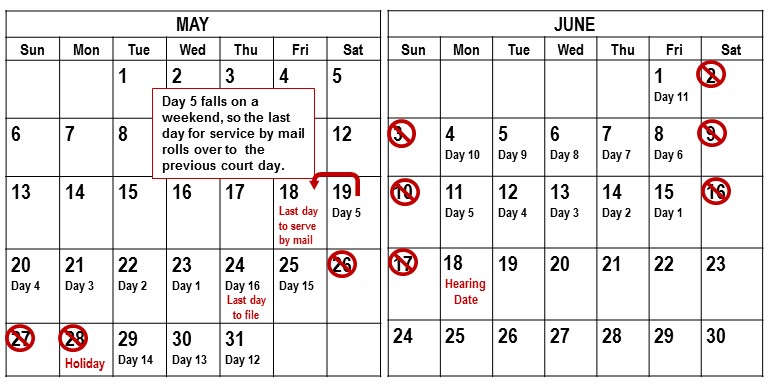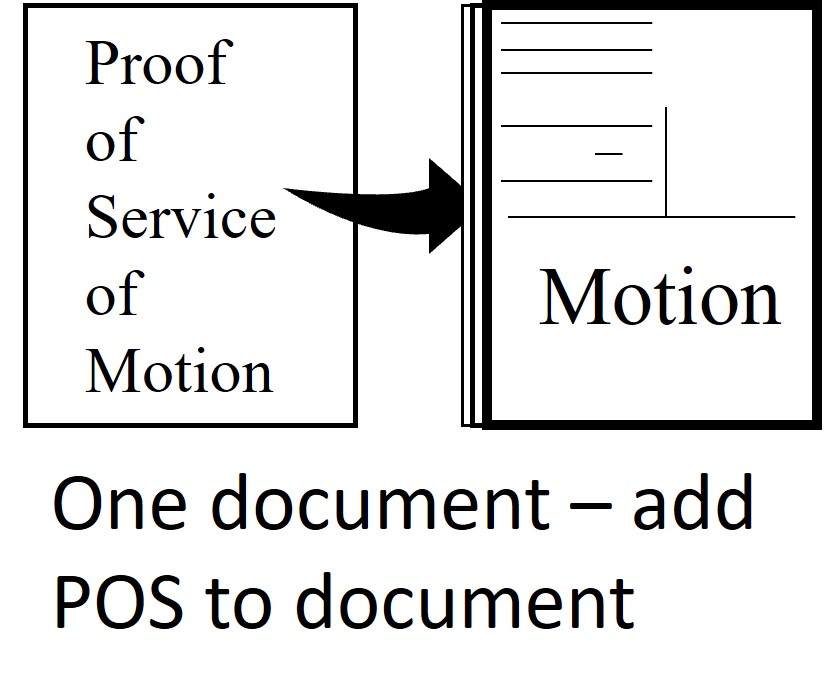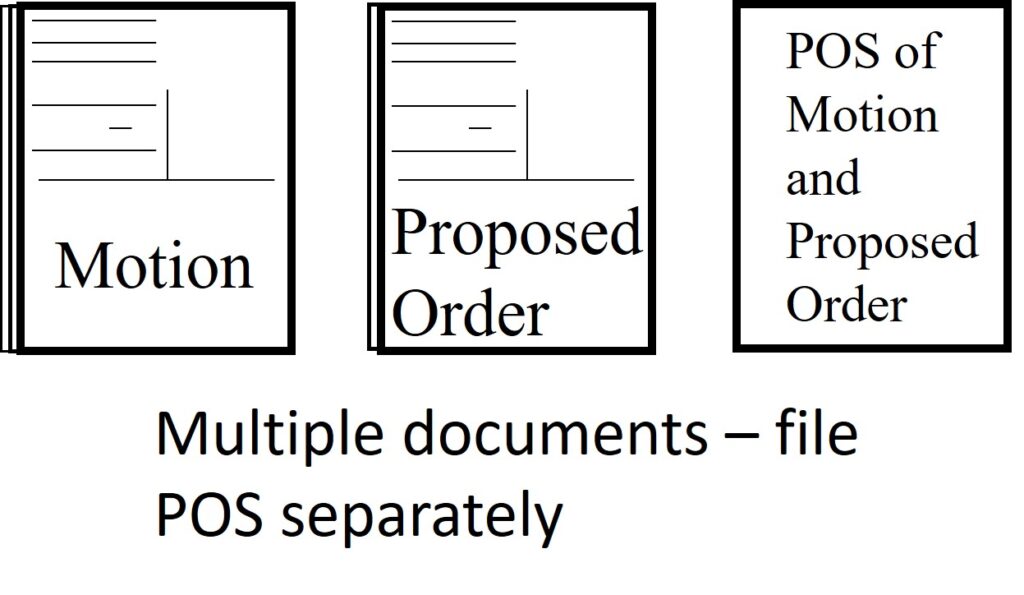Serving Motions and Notices of Hearing in a Civil Case
Any time you schedule a motion or other hearing in a civil case (including family and probate), you must give the other party or parties formal notice by serving them with a copy of all your paperwork. Most of the time, motions are served by mail, and that is what this guide focuses on.
Deadlines for Service
Tip: The deadline is the last day you can serve the motion. You can always serve it earlier if it is convenient.
There is always a minimum amount of notice you must give the other parties. Generally it is the same as the filing deadline, extended by a few days if you serve by any method other than personal service.
Motions
Motions are usually served by mail, and the deadline is extended by five calendar days if mailed to an address in California (10 for out of state, 20 for outside the U.S.).
There are a few other options:
- if the notice is served by express mail, or other overnight delivery method: add two calendar days
- Fax: add two court days. Limitations: you must first exchange written agreements to serve each other by fax. If you agree to receive fax service, you must have a fax machine on and ready to accept faxes between 9 a.m. and 5 p.m. on days that are not court holidays. (Cal. Rules of Court (CRC) 2.306(a(1), (d), (f).)
- Email: add two court days. Limitations: You can serve unrepresented parties by email only if that party has filed and served Consent to Electronic Service and Notice of Electronic Service Address (EFS-005-CV). You can serve attorneys by email without consent if you first contact their office and confirm the email is correct.
California Code of Civil Procedure (CCP) § 1005b, CCP § 1010.6. Note that for most forms of service, the extra days are calendar days, but for email they are court days.
Motions for summary judgment and summary adjudication have special timing rules. One of these special timing rules is that service extensions are always counted in court days.
Oppositions and Replies
Opposition papers and reply papers must always be served by a method “reasonably calculated” to ensure the other party receives it by closing on the business day after the court receives it, including:
- personal service
- Express Mail/overnight delivery
- fax (with prior consent)
- email (with prior consent, if the recipient is self-represented)
Calculating Deadlines and Extensions
To determine the service deadline, first determine the legal deadline to file the motion in court, then count back from that deadline the required number of days.
Motions for summary judgment/summary adjudication have very different deadlines. The motion must be filed 75 calendar days before the hearing date. Additional deadlines apply to summary judgment/adjudication motions and discovery motions when a trial date has been set.
The last legal day to file with the court for most motions is at least sixteen court (business) days prior to the motion date (CCP § 1005). “Court days” are Monday through Friday, excluding court holidays. To find this deadline, start counting backwards on the day before your hearing until you reach the sixteenth court day. (CCP § 12c)
Find the Filing Deadline
For example, suppose your reservation is for Monday, June 18. You would start counting backward using the previous court day, Friday, June 15, as day one, as shown in the calendar below. Skip weekends and court holidays (there is one court holiday in this example, which is Memorial Day, May 28). The sixteenth court day before the hearing would be May 24, which would be the last day that the motion could be filed.

Find the Service Deadline
Now you can determine the deadline for service.
- Personal service: May 24, the same as the filing deadline.
- Service by mail: May 18. Starting from the filing deadline, count back five calendar days. In this case, Day One would be May 23, and Day 5 would be Saturday, May 19.
“Calendar days” include weekends and holidays, but if the final day lands on a weekend or holiday, it is pushed back to the previous court day. Since May 19 is Saturday, the previous court day is Friday, May 18, and that is your service by mail deadline. - Overnight mail and fax: May 22 (two calendar days before the filing deadline of May 24).
- Email: May 22 (two court days before the filing deadline of May 24.)
Put the Deadline on Your Calendar
Make a note on your calendar to have the motion served by mail before the deadline. If you miss the mail deadline, you can still have the motion served by personal service up until 16 court days before the hearing. If you miss that deadline, you will have to cancel your court date and start over.
Serving Documents by Mail
Fill out as much of the appropriate proof of service as you can. If serving by mail, use Proof of Service by Mail (POS-030).
You can address and stamp the envelope(s), too.
Make one complete copy of your documents (including the unsigned proof of service) for each other party in the case.
Have the server seal up the envelopes and put them in the mail.
The server must then sign the proof of service form, and return it to you.
Filing the Proof of Service
You must file the signed proof of service (along with the required number of copies) in court.
The moving party’s deadline to file a proof of service is 5 court days before the hearing date. (CRC 3.1200(c)).
It is simplest to file it along with the motion or other papers. It is usually attached as the last page of the filed document. Make sure the original, signed proof of service is attached to the original, signed papers.
It is also acceptable to file the proof of service as a separate document. For example if you have not received a signed copy back from the server prior to filing, or if you listed multiple documents on the same proof of service, you can file the proof of service as a standalone item.
 |  |
Common Questions and Traps
Who can serve court papers?
Not you! If you are a party, you cannot serve court papers yourself.
The server can be any person over 18 who is not a party to the case. This can be a friend or family member, or you can hire a process server.
Doesn’t the court serve the papers for me?
No. Except in small claims court, the court will not serve papers for you.
Who do I have the motion served on?
If the party has an attorney, always serve the attorney. Use the name and address the attorney has been using on court paperwork (find it on on the top left of papers they file).
If the party does not have an attorney, serve the party at the address they use on court paperwork.
If the party or their attorney files a Notice of Change of Address or Other Contact (MC-040), make sure to use the new address.
What if there are multiple parties? Do I have to serve them all?
Yes. You must serve every party in the case with any papers you file in court, even if they are not part of the motion.
Can I mail it myself if I use certified mail?
No. If you want to use certified mail, someone else will need to take it to the post office and send it, then sign the Proof of Service.
Should I use certified mail?
Certified mail can backfire. If the other party refuses to sign for it, you will not have valid service.
If I don’t use certified mail, how do I prove it was actually served?
As long as the Proof of Service is properly filled out, the fact that your server signed the Proof of Service under penalty of perjury is legally sufficient proof.
If you are particularly concerned that they may lie and claim they were never served, you may want to have the server use a trackable form such as USPS Priority Mail with a Certificate of Mailing and/or USPS Tracking selected.
Don’t you have to serve people by handing them papers and saying “You’ve been served?”
No, except for the summons and complaint and a few rare situations. You can almost always serve court papers by having someone mail them, then sign a Proof of Service.
Personal service is always acceptable, but mail service is usually less expensive and easier.
This material is intended as general information only. Your case may have factors requiring different procedures or forms. The information and instructions are provided for use in the Sacramento County Superior Court. Please keep in mind that each court may have different requirements. If you need further assistance consult a lawyer.




